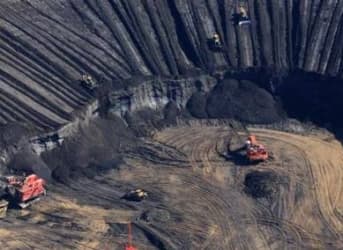Canada’s economy, lately driven in large part by oil, is a classic example of the old see-saw axiom: Downward pressure in one place creates upward pressure in another.
In this case, the bad news of low oil prices for the provinces of Alberta, Newfoundland and Saskatchewan, which until recently were enjoying an oil boom, becomes good news for Manitoba, Ontario and Quebec.
Alberta is a good model for what’s begun to go wrong in Canada. Already, three huge oil companies have canceled oil sands projects there: Shell of Britain at Pierre River, Statoil of Norway at the Corner oil field and France’s Total at the Joslyn mine. And more cancellations are expected as what feels like a non-stop drop in oil prices drives even more energy companies to postpone or even cancel projects.
Related: How Broken Are The Energy Markets?
The reason is that Alberta, Newfoundland and Saskatchewan have been experiencing a boom not in oil, but in oil sands, sandstone impregnated with crude oil. While shale oil is expensive to extract, oil sands are expensive to clean. And at the current average price of crude, which is now just above $50 per barrel, both forms of oil are becoming less and less profitable.
All this means hard times ahead for Alberta, and it’s becoming a recurring nightmare. Oil prices dropped fairly precipitously in the 1980s, but the province’s premier at the time, Don Getty, chose to keep his government’s spending static in hopes that oil would recover. Instead, energy revenues fell by $3 billion, creating a provincial deficit of $3.4 billion.
Getty’s successor, Ralph Klein, began his term attacking the deficit, dramatically slashing spending on such programs as the arts and medical care, and even sold off Alberta’s public telephone company, AGT, to private owners.
Alberta’s budget isn’t all that’s at risk from lower oil prices. When a region goes from boom to bust, it also loses jobs in the field and in company offices, which today are housed in modern skyscrapers that define Calgary’s dramatic skyline.
The bad news for Alberta, though, can be very good news for other provinces whose economies aren’t driven by oil. For these provinces, such as Ontario, declining fuel prices mean lower production costs and even more jobs.
Related: If Shell Backs Out, Arctic Oil Off the Table for Years
“Eventually, as we move through 2015, assuming the oil price stays low, it will start contributing to some weakness showing up in Alberta and Saskatchewan,” Paul Ferley, assistant chief economist at RBC Economics Research, told Canada’s Financial Post. “This should also result in a pickup in manufacturing in Ontario, as well as provide a lift in Manitoba and Quebec.”
Still, Canada’s overall economy relies enough on oil that its lower price can’t help but hurt, if only a little. On Nov. 12, the country’s finance minister, Joe Oliver, said the price drop could cut federal revenues by up to $2.5 billion each year from 2015 through 2019. And that was based on the average price of oil in mid-November – $70 per barrel – nearly $20 higher than it is today.
That can’t be good for Canada’s gross domestic product, and by extension it isn’t good for the country’s employment status. Still, Ferley said, his firm is “not expecting a big hit to GDP, so on net, nationally, we’re not expecting a big hit on the overall [employment] numbers.”
By Andy Tully of Oilprice.com
More Top Reads From Oilprice.com:
- By Buying Canada’s Talisman, Spain’s Repsol Nearly Doubles In Size
- Big Oil Slashing Spending Amid Low Prices
- Is The Canadian LNG Export Dream Dead?


















